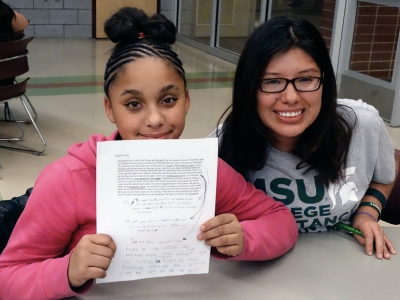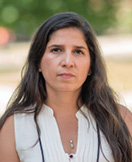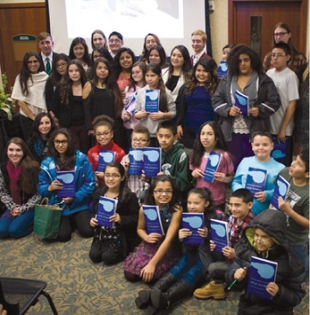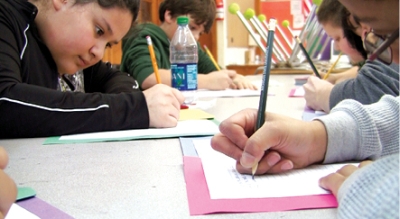Learning to Belong: Programs Help Lansing Students Strengthen Cultural Identity
- Estrella Torrez
- Associate Professor
- Residential College in the Arts and Humanities

A Nuestros Cuentos student shares a work in progress.
 When Estrella Torrez, an associate professor with the Residential College in the Arts and Humanities, came to Michigan State in 2008, she wanted to find ways to support Lansing's Native American and Latino communities. Her early inquiries led her to make connections with organizations like MSU's College Assistance Migrant Program, the Lansing School District, and Ingham County, and eventually resulted in, among other things, the development of two programs that aim to help Lansing elementary students connect with their ethnic communities.
When Estrella Torrez, an associate professor with the Residential College in the Arts and Humanities, came to Michigan State in 2008, she wanted to find ways to support Lansing's Native American and Latino communities. Her early inquiries led her to make connections with organizations like MSU's College Assistance Migrant Program, the Lansing School District, and Ingham County, and eventually resulted in, among other things, the development of two programs that aim to help Lansing elementary students connect with their ethnic communities.
Indigenous Youth Empowerment Program

Young Indigenous and Latinx authors proudly display their published books at the 3rd Nuestros Cuentos book reception hosted by MSUFCU.
Native American students in the Indigenous Youth Empowerment Program (IYEP) meet after school throughout the year, attend a summer enrichment camp, and participate in a full calendar of community events. The aim of these activities is to build up local Indigenous communities, communicate traditional knowledge, and help students become more aware of their culture so they can become leaders in the community.
The program is a collaboration between Michigan State University's American Indian and Indigenous Studies program, the Lansing School District's Title VII Native American Program, MSU's Residential College in the Arts and Humanities, the Ingham County Health Department, Fenner Nature Center, and Lansing Community College (LCC).
Torrez codeveloped the program with Becky Roy, who was the Lansing School District Native American Program Coordinator, and Ashley Harding, who was the Native American Advocate for the Ingham County Health Department.
Jaclynn M. Lloyd currently oversees the Native American Outreach Program (NAOP) for the Ingham County Health Department and is one of IYEP's codirectors. She, Ramona Henry, Emily Sorroche, and Torrez coordinate the K-12 after-school programs and summer enrichment camp for urban Native youth in the Greater Lansing area.
The program promises benefits beyond the student experience. "IYEP creates a space for the community to gather and gives the NAOP the opportunity to meet face to face with community members," said Lloyd. "This is helpful for connecting individuals to community supports and helps build rapport."
She also points to the program's community-building activities: "IYEP's community feasts have impacted the extended Indigenous community of Ingham immensely," she said. "These monthly potlucks came out of a conversation with the elders about feeling like they were left out from a lot of the activities that were geared towards kids. Now, people of all ages are able to come together over food and form relationships."
Indigenous Youth Empowerment Program Partners
Michigan State University
American Indian and Indigenous Studies Program
Residential College in the Arts and Humanities
Estrella Torrez
Office of Cultural and Academic Transitions
Emily Sorroche
Ingham County Health Department
Jaclynn M. Lloyd (IYEP Codirector)
Ashley Harding
Lansing School District
Ramona Henry
Sergio Keck
Becky Roy
Fenner Nature Center
Lansing Community College
Nuestros Cuentos Partners
Michigan State University
Residential College in the Arts and Humanities
Estrella Torrez
College Assistance Migrant Program
College of Arts and Letters
Department of Writing, Rhetoric, and American Cultures
Lansing School District
Sergio Keck
Lansing Community College
MSU Federal Credit Union
Nuestros Cuentos
The other project Torrez helped create is Nuestros Cuentos ("Our Stories"). Nuestros Cuentos is an after-school program that teaches fourth- through sixth-grade Latino students the art of crafting stories as a way of affirming their cultural identities. Students from Mt. Hope Elementary School and Pattengill Academy meet twice a week with high school and college mentors who help them develop the story they want to tell. At the end of the semester, the stories are put into a professionally produced book that is designed and illustrated (with the help of faculty and students from MSU) and unveiled at a reception hosted by the MSU Federal Credit Union, where stories are read out loud to family, friends, and community leaders.
Torrez's work on Nuestros Cuentos came after a few years of working on IYEP. In discussions with Sergio Keck, director of Special Populations and Programs for Lansing Public Schools, and others, Torrez observed that the topic of Latino students not feeling like they belonged kept coming up. As Torrez explained, "The reality is that there is a significant population of Latino students in the Lansing School District who aren't immigrants, whose family are third and fourth generation, and may not speak Spanish. These students just weren't seeing themselves fit in."
"So we asked ourselves, wouldn't it be great if these kids told their own stories?" she said. "If they shared what it means to be Latino in this time, in this place? And got those stories shared and disseminated so that others could understand that the Latino experience is a complicated experience?"
From the MSU student perspective, the program is structured around a community engagement class Torrez teaches in the Residential College in the Arts and Humanities (RCAH). Students from RCAH enroll for it, as do students from the College Assistance Migrant Program.
"We meet twice a week and go over content, because a lot of these students might not have formal training to work with mentoring youth. So we go over that in the class," she said.
Since its inception in 2014, the program has been continually changing. The focus of the class changes, as do the participants.
"Last spring was interesting because it included graduate students from the Department of Writing, Rhetoric, and American Cultures who integrated improv and different forms of community-building activities, international students from LCC, and then Latino high school students from Eastern High School," Torrez said.
For the school district, the benefits of the program are evident. As Sergio Keck explained, "The beauty about this program is that they're improving their writing skills through a culturally appropriate and interesting topic to the children."
Keck describes a two-pronged benefit for the participants: "First, the students learn how to tell the story of how they got here, or who was here before them. How did their family travel here? What was the family like? They learn about the story first, and then they tell it. Then, as they mature and get older, they have something already documented that they're able to go deeper into. They tell their background when they're kids, they learn a little bit about it, and then as they get older it's the foundation for more deep research into their own families."

Nuestros Cuentos students are excited to put their stories down on the page.
As with IYEP, Nuestros Cuentos has value for the larger community—family and friends in particular, but also for community leaders. "For the students that participate in the program it has a very big impact on them and their family," Keck said. "Everybody's very proud of it, and every parent and grandparent likes to know, and feels good, when their kids talk about them. They're not forgotten."
Milagro Davaloz attends Lansing's Everett New Tech High. For three years—fourth grade through sixth grade—she participated in the Nuestros Cuentos program. She described the program as "a place where Latino and Native American kids can show their capability to be creative and have fun while, at the same time, helping the community around us learn more about our culture."
"My mother absolutely loves Nuestros Cuentos," Davaloz said. "Ever since I was little I would tell my mom stories I made up from the top of my head, and if she let me I could make a story hours long. And she loves it because it allows me to have a place to jot these stories down and let others have the chance to hear and read my stories."
"I would love to come and help younger students in the future with Nuestros Cuentos because being a growing writer it helps me get other points of view, and also being a veteran of Nuestros Cuentos it makes me smile to see children that are now in my fourth- and fifth-grade shoes having fun and letting all the creative juices flow."
- Written by Matt Forster, University Outreach and Engagement